Which are the common Mosquito-borne Fevers?
When the rains come in, so do the mosquitoes, heralding the season of mosquito-borne fevers and infections. The common infections spread by mosquito bites are Malaria, Dengue, and Chikungunya, prevalent mainly in Asia, Africa, and Central-Southern America. Zika outbreaks have been seen in some countries a few years back and recently in July-Aug 2021 in Kerala and Maharashtra, India. While Malaria is caused by a parasite (Plasmodium) and is spread by the Anopheles mosquito, Dengue, Chikungunya, and Zika are caused by viruses and spread by the Aedes mosquito.



Do these conditions have similar or distinct symptoms?
Symptoms usually develop 5-15 days after the mosquitoes bite and transmit the infection. Most of these mosquito-borne fevers manifest in a very similar way with –
- High fever (usually>101 deg F), sometimes with chills and sweats.
- Body ache (muscle pains, joint pains, headache, or eye pain),
- Fatigue and Weakness.
It is often difficult to clinically differentiate the mosquito-borne fevers from each other and even from Viral Flu (Influenza) or from the currently spreading COVID-19. Loss of taste-smell with fever, sore throat and cough are highly suggestive of COVID. One can even suffer from Dengue and Chikungunya simultaneously. Mostly differentiation is done based on lab tests, and also experience of the prevalent disease and mosquito breeding patterns in a particular region or geographical area.
Sometimes there are differentiating clues in the clinical symptoms as below :
- Fever in Malaria is typically cyclical (though may not always clearly manifest this way) with a cold chills stage, hot fever stage and then a sweating stage. In Dengue and Chikungunya, fever is usually constantly high. Fever in Zika is usually not that high (<101 F)
- Rashes are seen in Dengue and Chikungunya. While in Dengue the rashes are more common on the face, in Chikungunya rashes are more common on torso and arm. In Zika, the rash starts on the face and spreads throughout the body. Rashes are rare in Malaria.
- Bleeding spots under the skin or nosebleeds are characteristic of Dengue.
- Joint pains in Dengue are mainly experienced in the shoulders, back and knees. Joint pains with swelling seen in hands, wrist, leg and feet are characteristic of Chikungunya and can sometimes last for months and even years after other symptoms are gone. Joint pains in Malaria and Zika are usually not as severe as in Chikungunya or Dengue, and can be present in any of the joints.
- Eye pain (pain behind the eyes, or on moving the eyes) is seen commonly in Dengue and Chikungunya, while it is rare in Malaria. Redness of the eyes (conjunctivitis) is sometimes seen in Dengue and Zika, but is usually not seen in Malaria and Chikungunya.
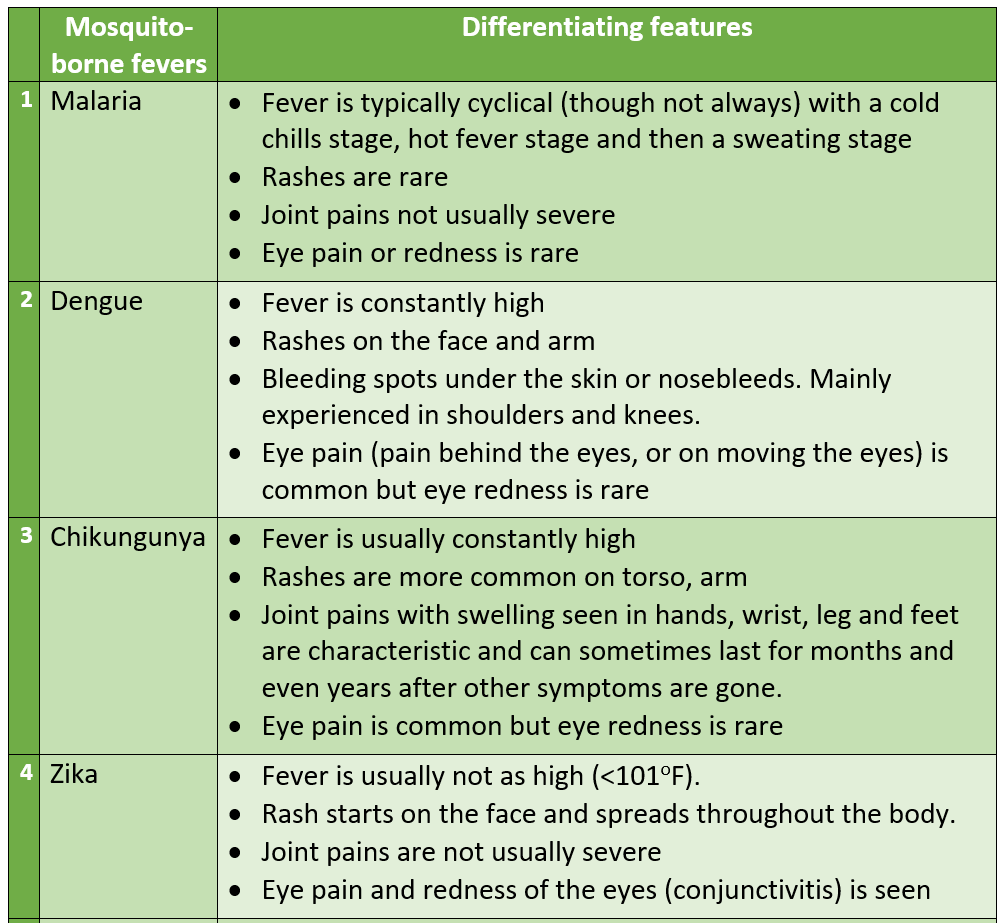


How does one confirm which disease it is?
Most of the time blood tests are required and are often the only way to differentiate these conditions and confirm the diagnosis. A drop in the platelet and white blood cell count is typical of Dengue. In Malaria, the parasite is usually visualized in the red blood cells under the microscope, confirming the diagnosis. There are rapid diagnostic tests for antigen detection as well as serological tests for antibody detection available now in most labs for all these conditions, which help to establish the diagnosis.
What is the treatment?
Among these conditions, specific treatment is available only for Malaria as it is caused by a parasite (called Plasmodium) for which anti-malarial drugs are available. Chloroquine along with primaquine is used to treat areas where resistance has not been seen. In areas with known chloroquine resistance (or no response to chloroquine in 72 hours), drugs used include artemether-lumefantrine, or artesunate + sulfa (sulfadoxine/sulfalene)–pyrimethamine combination therapy (SP –ACT) followed with primaquine. Arteether or quinine injection may be used in hospitalized patients.
The other conditions are all caused by viruses, therefore treatment mainly consists of controlling fever and pain (with paracetamol), and maintaining hydration with adequate fluids. It is important to avoid NSAID group of drugs (like ibuprofen, diclofenac, etc.) to reduce pain and fever as they can also increase bleeding risk, especially in Dengue patients.
What are the complications? When is hospitalization required?
Severe dehydration, shock (due to increased fluid leakage from blood vessels) and multiple organ failure are complications that can be life-threatening or lead to fatalities. This is especially seen in Dengue (Dengue Shock Syndrome).
In Dengue, a drastic fall in platelets can also lead to bleeding and hemorrhage in vital organs causing death (Dengue Hemorrhagic Fever).
In Malaria, bursting of red blood cells and release of hemoglobin in the blood can cause kidney failure and death (called Blackwater fever as urine appears black). Severe anemia due to malaria is a complication often seen in children. When blood cells filled with the malarial parasite block small blood vessels of the brain, a complication called cerebral malaria can develop due to swelling and damage of the brain. This can present with disorientation, delirium, seizures, and even coma. It is seen with the Plasmodium falciparum type of malarial parasite.
Zika in a pregnant woman can cause organ defects and abnormalities (congenital Zika syndrome) in the newborn, and also increase the risk of miscarriage, stillbirth and preterm birth. Rarely, Zika can cause Guillain-Barré syndrome, in which a person’s own immune system damages the nerve cells, causing muscle weakness, and sometimes paralysis. Other very rare complications seen with Zika include swelling of the brain and spinal cord (myelitis), neuropathies and blood clotting problems.
Complications and death are quite rare in these mosquito-borne fevers but there are certain vulnerable high-risk groups, who should seek medical attention immediately once symptoms appear, and preferably be hospitalized, or closely monitored.
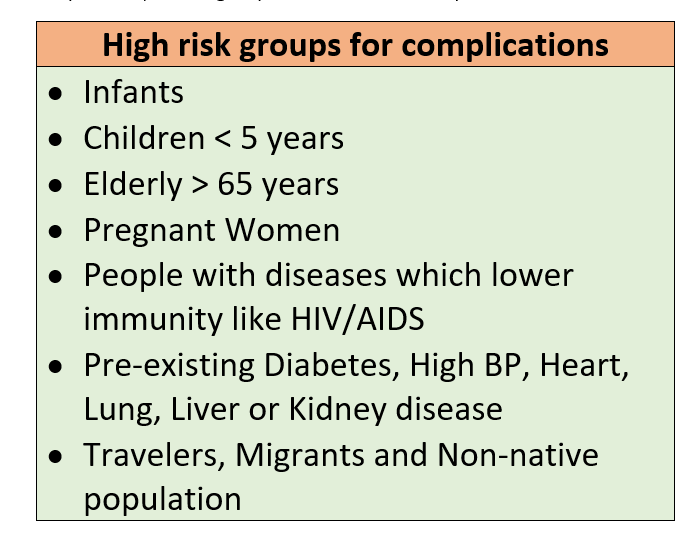


Most otherwise healthy adults can be treated at home or on an out-patient basis with rest, adequate fluid intake (plenty of water), soft diet and paracetamol for fever-pain.
Hospitalization should be considered in these patients if there is –
- persistent vomiting and abdominal pain,
- reduced oral fluid intake
- signs of dehydration (reduced urination, cold clammy extremities, dry lips and mental disorientation)
- breathlessness
- neurological signs like fits, altered mental state, restlessness or delirium
- drop in blood pressure
- severe anemia
- platelet count falls critically low (<20,000/m3) or presence of bleeding from any site
Once having had the disease can one get it again?
There are 4 types of Dengue Virus (DENV 1,2,3,4) and Malarial parasite Plasmodium (vivax, falciparum, ovale, and malariae). Since there is more than one type of Dengue virus, one can get re-infected with another type but not the same type of Dengue virus. One Malaria infection does not confer immunity to another one, and sometimes the malarial parasite can remain dormant for many years in the liver and cause recurrence. Usually once having suffered from Chikungunya and Zika, one is not likely to get it again.
Malaria vaccine (against Plasmodium falciparum) is available and was endorsed by WHO in October 2021 mainly for use in children of Africa. Dengue vaccine though developed is not used routinely due to concerns with the development of severe dengue in previously uninfected people.
Other Mosquito-Borne Diseases
Japanese Encephalitis (JE) usually occurs in selective geographical areas (endemic disease) mainly in the Indian subcontinent, China, Korea, Japan and Southeast Asia. It presents with brain symptoms (encephalitis) like confusion, disorientation, abnormal movements, delirium and seizures. It is spread by the Culex mosquito, which breeds in the stagnant water of puddles, ditches and fields and artificial containers like cans, bottles and storage tanks. Most adults in the endemic area acquire natural immunity, therefore JE mainly affects children. A vaccine is available for JE.
Yellow fever is found mainly in Africa and South America (not in Asia). Therefore, travelers to these areas should be aware of the risk and take the yellow fever vaccine before traveling. It is also spread by the Aedes mosquito. It presents mainly with fever and jaundice.
JE and Yellow Fever are all viral diseases.
Preventing Mosquito breeding and biting
Anopheles mosquitoes breed in hot-moist weather inside shallow stagnant or slow-flowing water collections like puddles, pools and streams in the rainy season. Aedes mosquitoes breed in holes in trees, angle of plant stems and in wide, preferably dark-colored or shaded containers (Aedes mosquito being small and dark-colored) especially also containing decaying leaves or algae.
Given below are protective measures to prevent mosquito breeding and biting, as well as a brief guide on applying mosquito repellents.
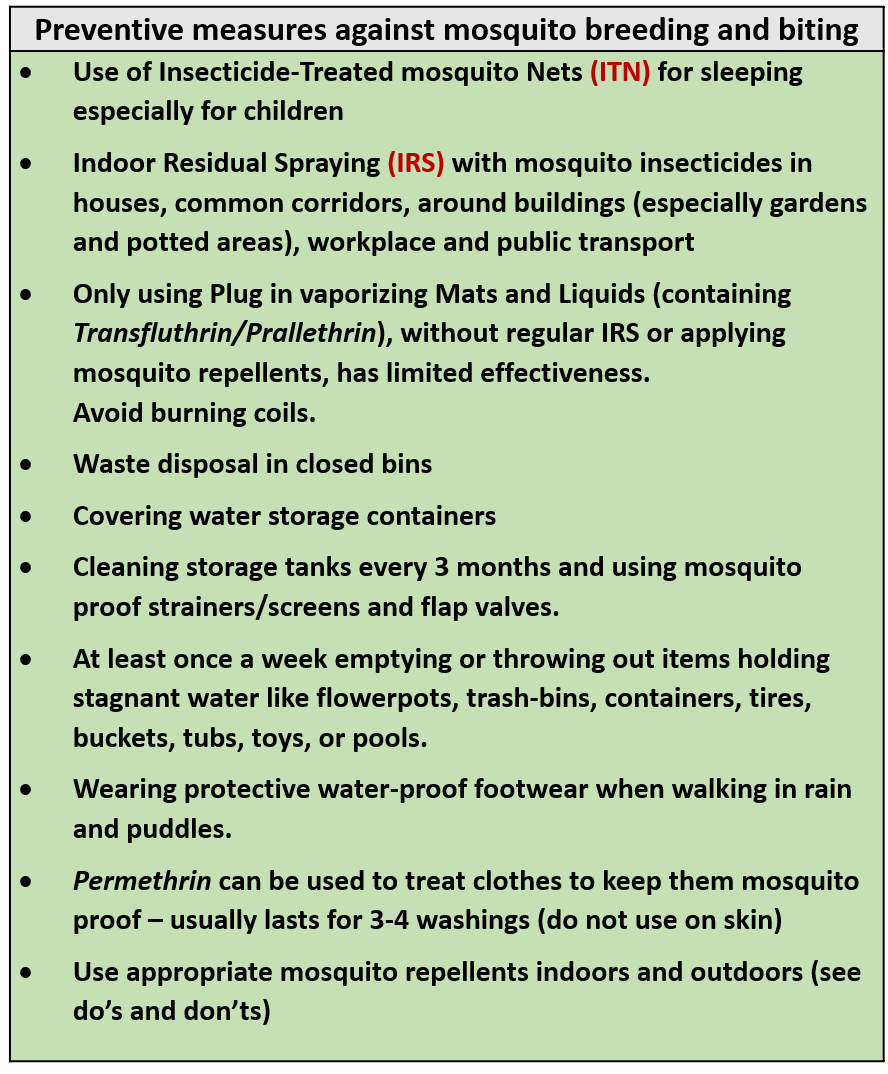


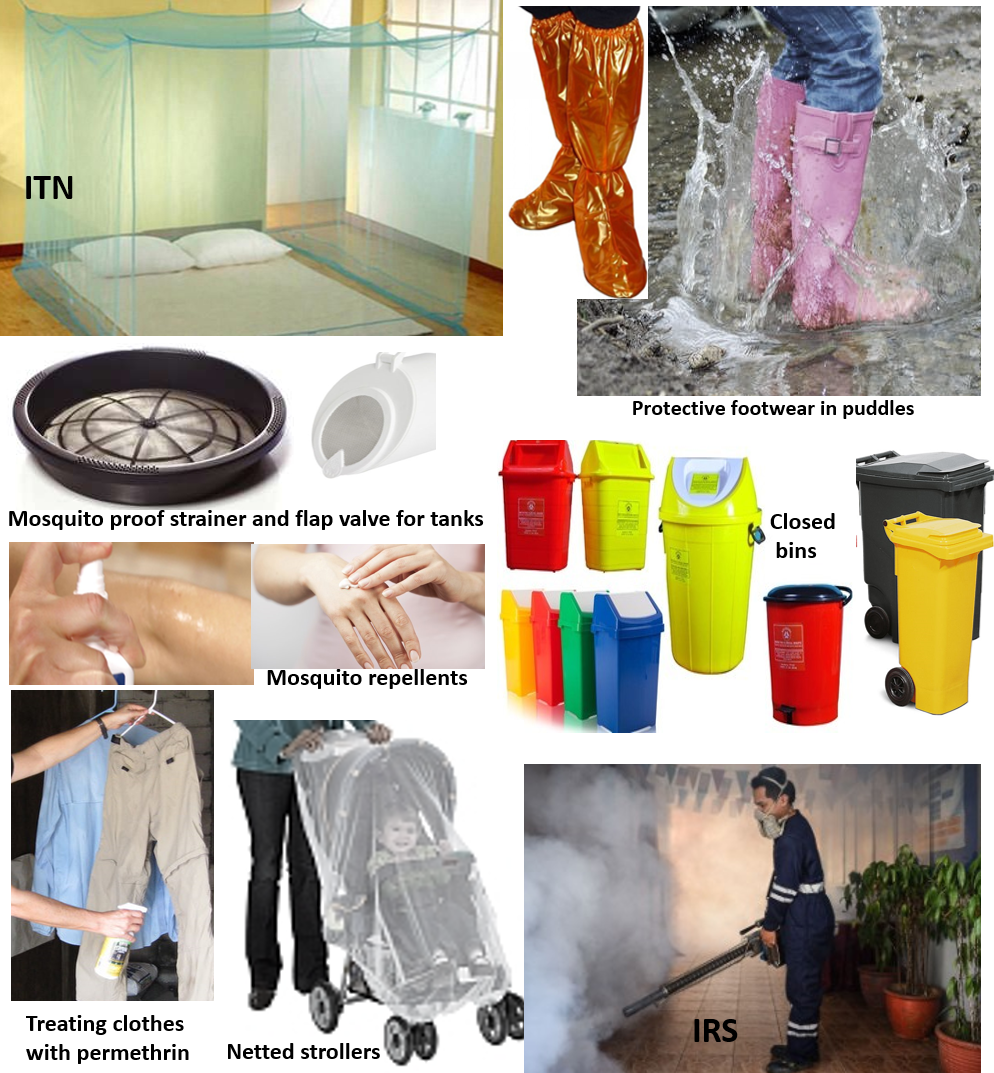


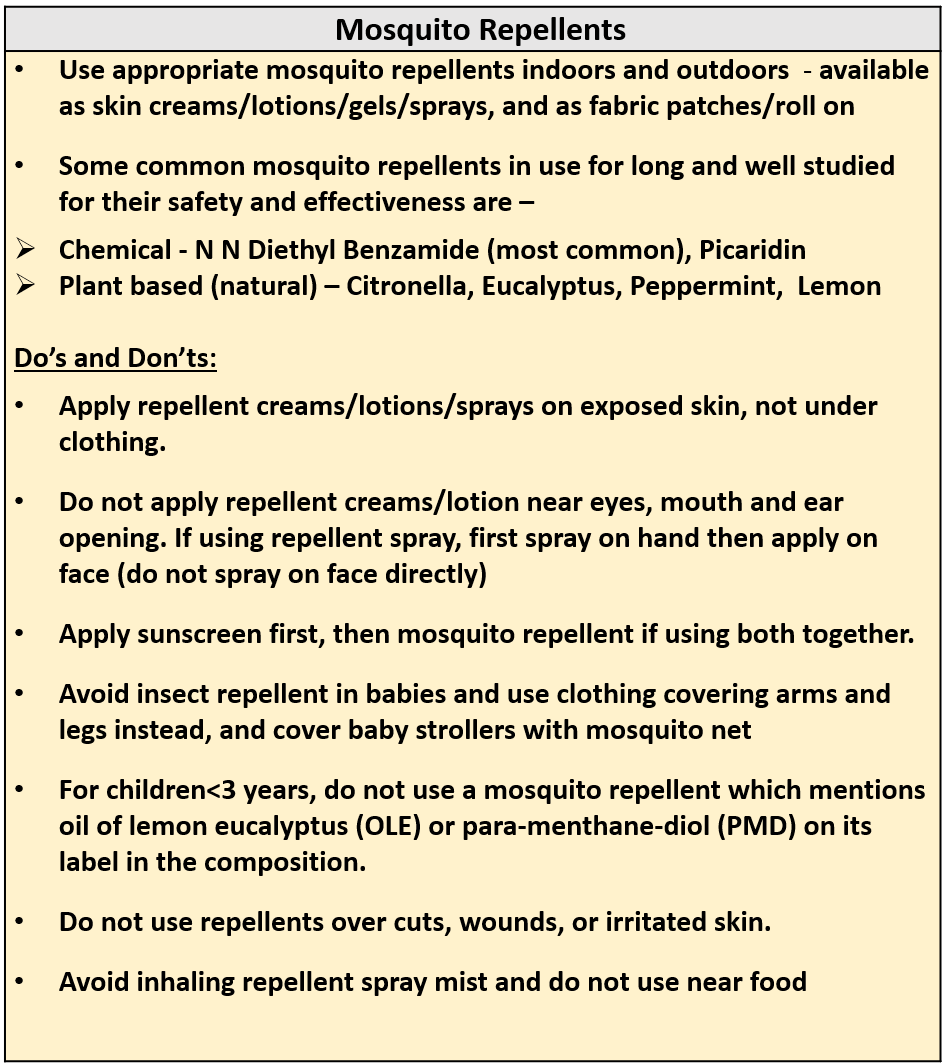


—————————————-
For any query, additional information or to discuss any case, write to info@drvarsha.com, and be assured of a response soon.
References:
WHO Malaria Dengue ZIKA CDC Chikungunya MOHFW, GOI SRL LAB TESTS EPA GOV Insect repellents
Also read-
Water-Borne Diseases, Contaminated Food and Gastrointestinal Infections
Temperature and Fever – Accurate Measurement and Interpretation


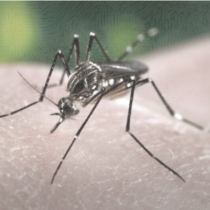
8 Comments
Very informative article and provides clarity on the different mosquito-sourced ailments. Is taking vaccination a must for the ailments for which they are available?
Vaccines are currently available for only Yellow fever and JE.
JE vaccine is recommended for children in defined pockets where these infections have been prevelant. The government usually makes it available in the health centres in these regions. Adults who are specifically travelling to these areas should take it but the adults living in these areas dont need do. Like in India UP and Bihar is a prone belt.
Yellow fever vaccine should be taken by all travellers to South American and African countries.
432372 303262I like this internet web site its a master peace ! Glad I detected this on google . 960320
hello, your internet site pages pattern is simple and clean and i like it. Your articles are incredible. Remember to maintain up the great work. Greets..
Nice and informative content. This will help many people who are fed up with mosquitoes. Thank you so much for sharing this information
We need this refresher and expert knowledge every year in the rainy season. Very useful article. Thanks for the excellent service being provided by you to educate, guide and warn the common people
This Blog Is Very Helpful And Informative For This Particular Topic. I Appreciate Your Effort
I’m very pleased to discover this site. I want to to thank you for your time due to this wonderful read!! I definitely enjoyed every part of it and I have you saved as a favorite to see new information in your blog.